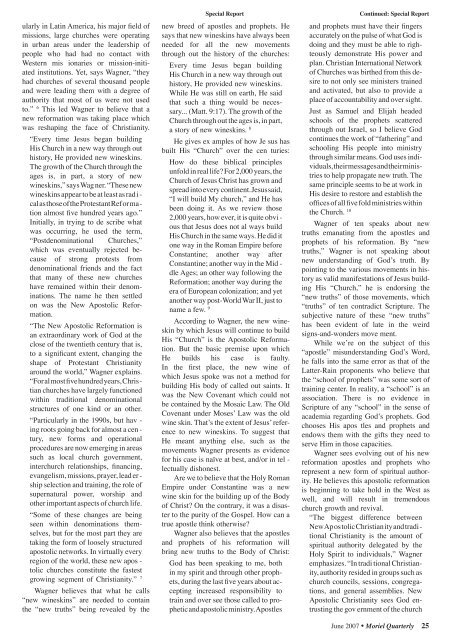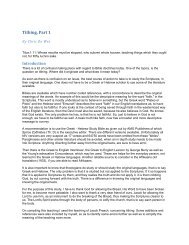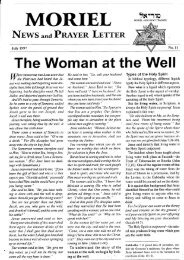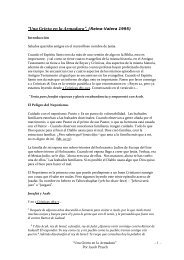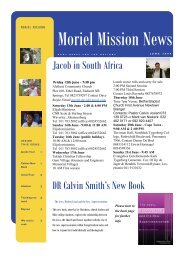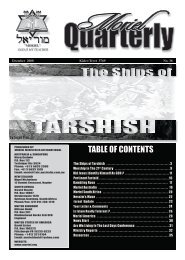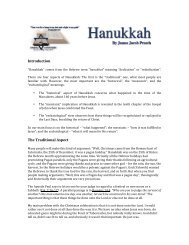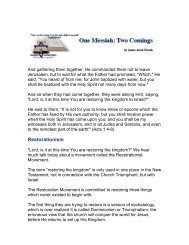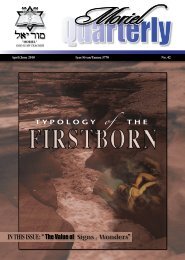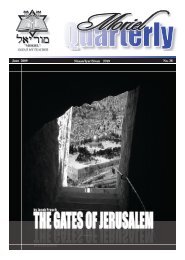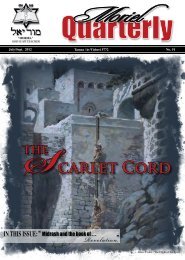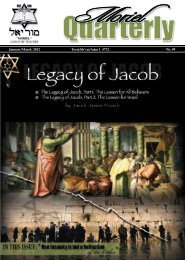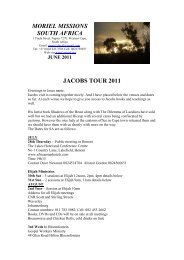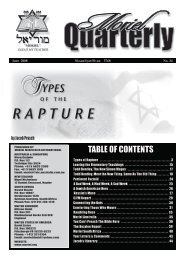Spiritual Warfare and Territorial Spirits (~5.5 MB) - Moriel Ministries
Spiritual Warfare and Territorial Spirits (~5.5 MB) - Moriel Ministries
Spiritual Warfare and Territorial Spirits (~5.5 MB) - Moriel Ministries
Create successful ePaper yourself
Turn your PDF publications into a flip-book with our unique Google optimized e-Paper software.
ularly in Latin America, his major field ofmissions, large churches were operatingin urban areas under the leadership ofpeople who had had no contact withWestern mis ionaries or mission-initiatedinstitutions. Yet, says Wagner, “theyhad churches of several thous<strong>and</strong> people<strong>and</strong> were leading them with a degree ofauthority that most of us were not usedto.” 6 This led Wagner to believe that anew reformation was taking place whichwas reshaping the face of Christianity.“Every time Jesus began buildingHis Church in a new way through outhistory, He provided new wineskins.The growth of the Church through theages is, in part, a story of newwineskins,” says Wag ner. “These newwineskins appear to be at least as rad i -cal as those of the Protestant Ref or ma -tion almost five hundred years ago.”Initially, in trying to de scribe whatwas occurring, he used the term,“Postdenominational Churches,”which was eventually rejected becauseof strong protests fromdenominational friends <strong>and</strong> the factthat many of these new churcheshave remained within their denominations.The name he then settledon was the New Apostolic Reformation.“The New Apostolic Reformation isan extraordinary work of God at theclose of the twentieth century that is,to a significant extent, changing theshape of Protestant Christianityaround the world,” Wagner explains.“For al most five hundred years, Chris -tian churches have largely functionedwithin traditional denominationalstructures of one kind or an other.“Particularly in the 1990s, but hav -ing roots going back for almost a cen -tury, new forms <strong>and</strong> operationalprocedures are now emerging in areassuch as local church government,interchurch relationships, financing,evangelism, missions, prayer, lead er -ship selection <strong>and</strong> training, the role ofsupernatural power, worship <strong>and</strong>other important aspects of church life.“Some of these changes are beingseen within denominations themselves,but for the most part they aretaking the form of loosely structuredapostolic networks. In virtually everyregion of the world, these new apos -tolic churches constitute the fastestgrowing segment of Christianity.” 7Wagner believes that what he calls“new wineskins” are needed to containthe “new truths” being revealed by theSpecial Reportnew breed of apostles <strong>and</strong> prophets. Hesays that new wineskins have always beenneeded for all the new movementsthrough out the history of the churches:Every time Jesus began buildingHis Church in a new way through outhistory, He provided new wineskins.While He was still on earth, He saidthat such a thing would be necessary...(Matt. 9:17). The growth of theChurch through out the ages is, in part,a story of new wineskins. 8He gives ex amples of how Je sus hasbuilt His “Church” over the cen turies:How do these biblical principlesunfold in real life? For 2,000 years, theChurch of Jesus Christ has grown <strong>and</strong>spread into every continent. Jesus said,“I will build My church,” <strong>and</strong> He hasbeen doing it. As we review those2,000 years, how ever, it is quite obvi -ous that Jesus does not al ways buildHis Church in the same ways. He did itone way in the Roman Empire beforeConstantine; another way afterConstantine; another way in the Mid -dle Ages; an other way following theReformation; another way during theera of European colonization; <strong>and</strong> yetanother way post-World War II, just toname a few. 9According to Wagner, the new wineskinby which Jesus will continue to buildHis “Church” is the Apostolic Reformation.But the basic premise upon whichHe builds his case is faulty.In the first place, the new wine ofwhich Jesus spoke was not a method forbuilding His body of called out saints. Itwas the New Covenant which could notbe contained by the Mosaic Law. The OldCovenant under Moses’ Law was the oldwine skin. That’s the extent of Jesus’ referenceto new wineskins. To suggest thatHe meant anything else, such as themovements Wagner presents as evidencefor his case is naïve at best, <strong>and</strong>/or in tel -lectually dishonest.Are we to believe that the Holy RomanEmpire under Constantine was a newwine skin for the building up of the Bodyof Christ? On the contrary, it was a disasterto the purity of the Gospel. How can atrue apostle think otherwise?Wagner also believes that the apostles<strong>and</strong> prophets of his reformation willbring new truths to the Body of Christ:God has been speaking to me, bothin my spirit <strong>and</strong> through other prophets,during the last five years about acceptingincreased responsibility totrain <strong>and</strong> over see those called to prophetic<strong>and</strong> apostolic ministry. ApostlesContinued: Special Report<strong>and</strong> prophets must have their fingersaccurately on the pulse of what God isdoing <strong>and</strong> they must be able to righteouslydemonstrate His power <strong>and</strong>plan. Christian International Networkof Churches was birthed from this desireto not only see ministers trained<strong>and</strong> activated, but also to provide aplace of accountability <strong>and</strong> over sight.Just as Samuel <strong>and</strong> Elijah headedschools of the prophets scatteredthrough out Israel, so I believe Godcontinues the work of “fathering” <strong>and</strong>schooling His people into ministrythrough similar means. God uses individuals,their messages <strong>and</strong> their ministriesto help propagate new truth. Thesame principle seems to be at work inHis desire to restore <strong>and</strong> establish theoffices of all five fold ministries withinthe Church. 10Wagner of ten speaks about newtruths emanating from the apostles <strong>and</strong>prophets of his reformation. By “newtruths,” Wagner is not speaking aboutnew underst<strong>and</strong>ing of God’s truth. Bypointing to the various movements in historyas valid manifestations of Jesus buildingHis “Church,” he is endorsing the“new truths” of those movements, which“truths” of ten contradict Scripture. Thesubjective nature of these “new truths”has been evident of late in the weirdsigns-<strong>and</strong>-wonders move ment.While we’re on the subject of this“apostle” misunderst<strong>and</strong>ing God’s Word,he falls into the same error as that of theLatter-Rain proponents who believe thatthe “school of prophets” was some sort oftraining center. In reality, a “school” is anassociation. There is no evidence inScripture of any “school” in the sense ofacademia regarding God’s prophets. Godchooses His apos tles <strong>and</strong> prophets <strong>and</strong>endows them with the gifts they need toserve Him in those capacities.Wagner sees evolving out of his newreformation apostles <strong>and</strong> prophets whorepresent a new form of spiritual authority.He believes this apostolic reformationis beginning to take hold in the West aswell, <strong>and</strong> will result in tremendouschurch growth <strong>and</strong> revival.“The biggest difference betweenNew Ap os tolic Christian ity <strong>and</strong> tradi -tional Christianity is the amount ofspiritual authority delegated by theHoly Spirit to individuals,” Wagneremphasizes. “In tradi tional Christianity,authority resided in groups such aschurch councils, sessions, congregations,<strong>and</strong> general assemblies. NewApostolic Christianity sees God entrustingthe gov ernment of the churchJune 2007 • <strong>Moriel</strong> Quarterly 25


